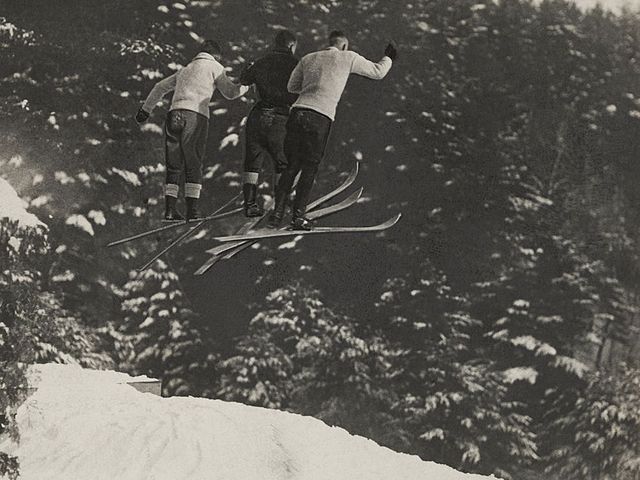
Of the three big Dartmouth weekends, Winter Carnival is considered the least notable by the average student nowadays. While old Winter Carnival posters might inflict some brief touch of nostalgia on the passersby in Collis, Dartmouth’s once prized winter bacchanalia has been passed over for the more excitable offerings of Homecoming and Green Key. Old stories of F. Scott Fitzgerald haunting the frats or other tales of “the Mardi Gras of the North” are not enough to reanimate a weekend that receives much fanfare yet has little to offer to current students. This decline might just be yet another body on the pile of corpses that is our failed traditions, but the loss of its appeal reveals a broader, more important shift in the culture of our school.
The appeal of Homecoming and Green Key is immediate and universal. Reconnecting with alumni and raging with campus should appeal to any twenty-year-old college student. While the ornamentation of each weekend might be unique to Dartmouth, their broader attraction resonates at any college across the country. However, the appeal of Winter Carnival is trickier to pinpoint and more specific to Dartmouth. Gaping at ice sculptures and sled races has sentimental meaning but lacks mass appeal, and even just the frigid temperatures of February in New Hampshire are off-putting to most.
The appeal of Winter Carnival lies not in its mass, universal qualities, but in its specific ones. Both our living traditions, such as the Winter Carnival Poster (though this limps on), and the dead ones, such as the Carnival Queen and dance, appeal to a student who is interested not in the broad trends or benefits of American colleges but in Dartmouth specifically. The lore of Winter Carnival haunts the student body, and those who carry on the love of this once-sacred day are those who are still attracted to the true Dartmouth. There is a certain quality to the Winter Carnival–maybe it’s the freezing temperatures or perhaps it’s the apropos fall from tradition–that makes it the most Dartmouth of the three weekends.
There is low appeal to Winter Carnival because the College has all but abandoned cultivating this appeal in students. The mass attraction of Homecoming and Green Key is easy to replicate and maintain as it is standard across Higher Education. Administrators know how to throw parties for alumni and allow students to quench their thirst to let loose, but maintaining legacies that are specific and odd to a place is much more difficult. In order to compete in the rankings with peer institutions, the easiest and most successful thing to do is to standardize across the board and then compete on universal markers of success. Instead of trying to attract students who would be most interested in the strange quirks of the College, the students who once at the College would become the most loyal sons and daughters of Dartmouth, the students who would maintain and still love the carcass that is Winter Carnival currently, Dartmouth now attracts the standard resume-striver who applies to all eight Ivies and picks the best one where they got accepted.
While they might enjoy or tout the oddities of the College, the vast majority of students more enjoy its prestige and resources, qualities that are important yet not unique to Dartmouth. These students are very impressive and successful, yet by prioritizing name and prestige, they will never have the same affinity for the College that drives the strange and specific appeal of traditions such as Winter Carnival forward. At the modern Dartmouth, the specific appeals of the College are merely ornamentation, while the core appeal is the prestigious name that is attractive to everyone in a standard way, shared by all institutions of this caliber.
I am struck by one tradition, now completely lost to time, that existed during the first fifty or so years of the College’s existence. Many years before the D-Plan and any modern curriculum, the College would not have classes during January and February, and instead, many of the students, seeking to make money to pay for their studies, would become local teachers in surrounding Upper Valley communities for these months. As in the early nineteenth century, the New Hampshire winter was too cold for boys to do much, teenagers in surrounding communities sought a level of education that was too advanced for the abilities of any local teachers. And so, when they were not taking classes, Dartmouth students filled in these positions. Nowadays, we like to tout social impact-making, but to have this form of local involvement en masse from students seems ludicrous.
Tales such as these demonstrate that Dartmouth was once not merely a name, but also a place and a people, of which everyone was interested in the specific circumstances of the College. As we have come to value the name of Dartmouth above all else, we should not be surprised that we struggle to identify and honor the peculiarities of the College’s legacy and traditions. Winter Carnival is dismissed because it is indicative not of a universally appealing name but of a specific place, and that place is Dartmouth. Until the College rejects the rankings rat-race and returns to an interest in the wonderful oddities of its own traditions, Winter Carnival will continue to occupy a place in the dustbin of the once proud history of the College.

Out with the Quest
In with the Fest
Bland is the rule
In the land of the fool